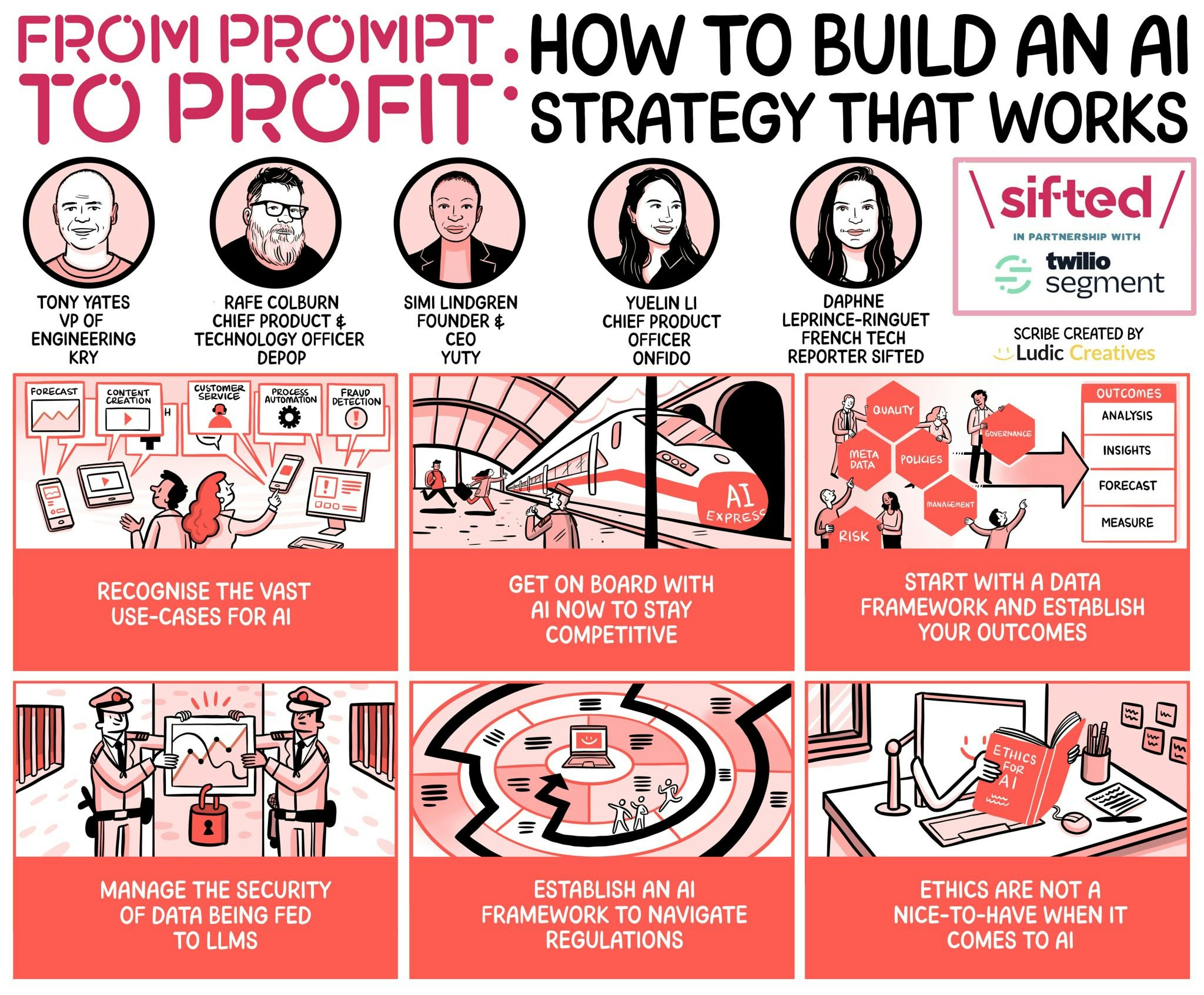Since the latest generation of artificial intelligence burst onto markets 18 months ago it has become a valued resource for businesses. McKinsey estimates it could contribute up to $15 trillion to global GDP by 2030 — but without a clear strategy, startups may not fully realise AI's potential.
In our latest edition of Sifted Talks, we explored how startups can effectively leverage artificial intelligence and build a robust AI strategy, while addressing the risks, limitations, and challenges of deploying the technology. Our speakers were:
- Rafe Colburn, chief product and technology officer, Depop
- Yuelin Li, chief product officer, Onfido
- Tony Yates, VP of engineering, Kry
- Simi Lindgren, founder and CEO, Yuty
Here are the key takeaways from the panel:

1) Recognise the vast use cases for AI
The panellists opened with a discussion on how they use AI in their operations. Yates from Kry, a digital-first healthcare provider, said they use AI in three areas: engineering with Microsoft Copilot, nurse-patient conversations, and patient record-keeping. “Around 700,000 ‘nurse chats’ have been accepted to date, so it's having a big impact on the clinician workflow and the overall efficiency and quality of the data that we record about patients,” he said.
Colburn from Depop said the fashion marketplace app has historically built its own AI models for search recommendations, trust and safety, fraud detection, and detecting counterfeits. However, they are increasingly introducing off-the-shelf tools into their workflows. While they don’t yet use generative AI for images, it is a possibility in the future, he said.
At Onfido, a tech company that verifies people’s identities, AI is integral to their core product. Li mentioned that they soon expect to use AI to translate their web copy into as many as 44 different languages.
Lindgren explained that Yuty, which provides personalisation tools for the beauty industry, uses AI models to analyse a person’s picture and make beauty recommendations, as well as helping businesses connect with customers.
“We need to ensure that we have robust and diverse data sets that accurately reflect the beauty consumer population. We are leveraging GANs (Generative Adversarial Networks) to create synthetic data to learn from the underlying patterns.” - Yuelin Li, chief product officer, Onfido
2) Get on board with AI now to stay competitive
All businesses need an AI strategy because now it’s an expectation, Colburn said. But he also provided a note of caution: “If you have a three-year strategy, you’re lying to yourself, because we don't know what's going to come out in terms of models in the next six months, nine months, a year.”
While AI strategies are important, Lindgren said they must be tied to purpose. “When you're building an AI strategy, it's really just not assuming that AI is the answer, but choosing what objectives are important for the business that need to be solved,” she said.
As a highly regulated health tech business, Kry must look two to three years ahead, Yates said, adding that the healthcare sector cannot afford rapid, iterative development cycles and must therefore proceed carefully. He also noted the importance of having human oversight when interpreting AI suggestions, as AI users can become complacent over time.
“Our strategy is to utilise all AI technologies, find out what their breaking points are, what they can do within our industry, who the people are we would need to include on that journey, who would be the regulators, who are the people that can stop us, and then ultimately, where does the funding stream come from?” — Tony Yates, VP of engineering, Kry
3) Start with a data framework and establish your outcomes
In a business like Yuty that provides over-the-counter products, Lindgren emphasised the importance of a strong data framework as some beauty products can exacerbate pre-existing conditions.
Colburn added that a data framework helps businesses identify new opportunities: New models and algorithms increase the efficiency and accuracy of many tasks, so it is worth revisiting old ideas. “Go back through the wish list of all the things you wish you could do for your customers but were technically infeasible before, and ask: What's possible today that wasn't possible six months ago?” he said.
Lindgren cautioned that while focusing on a framework and outcomes is crucial, autonomous, production-ready AI products are demanding and require significant ongoing investment.
“When it's actually the system making autonomous decisions, it has to be of an extremely high level of accuracy. You have to constantly monitor model drift, governance, and other components. I wouldn't underestimate that as a company.” - Simi Lindgren, founder & CEO, Yuty
4) Manage the security of data being fed to LLMs
To ensure privacy, Onfido formed multidisciplinary product development squads, comprising product, data, applied science, engineering, privacy and design teams. Li said the goal should be to bake privacy into products from the start rather than as an afterthought.
Yates echoed the sentiment, adding that they often involve legal and clinical teams, along with partners, stakeholders and customers, to check if they are taking a step too far with AI. They also use AI opt-out tools to allow users to choose not to participate in AI systems.
At Depop, data collection methods used in the past asked customers to flag personally identifiable information (PII), making it easier to comply with privacy regulations and integrate AI systems without compromising user privacy.
Colburn added that open-source large language models (LLMs) are a viable option for many companies that are concerned about customer privacy when using third-party providers. This is because open-source LLMs can be run on an internal server and be customised to specific needs.
“If you're running an open-source LLM on your own cloud, you know exactly where the training data is going and can delete it when you want to. My feeling is the open source side is keeping pace with the commercial pretty quickly.” - Rafe Colburn, chief product & technology officer, Depop
5) Establish an AI framework to navigate regulations
Yates recommended establishing rules for AI. At Depop, staff are free to use any pre-approved LLMs because they’re trained on publicly available data.
At Onfido, regulatory compliance can be costly and time-consuming. But in markets with clear rules, the business is thriving. Li said that some competitors have left regulation-heavy geographies, but added that’s most likely short-term thinking.
Colburn said it’s better to have a confident, one-size-fits-all strategy, rather than making decisions on a case-by-case basis.
“If you try to stay on the side of what's sensible and acceptable, then you should have a much smoother path through the regulations.” - Tony Yates, VP of engineering, Kry
6) Ethics are not a nice-to-have when it comes to AI
“I was smiling because I was thinking about the fact that ethics could be a nice-to-have,” said Lindgren. “For us, it's kind of like the most important thing. Everyone can appreciate the hugely transformative benefits of AI, but we also have to think about the potential unintended impacts that it could have on the end user and consumer.”
Yates from Kry is concerned about the impact of mixing machine and human data in patient records. Machines will eventually draw inferences from this combined data set, so Kry is taking steps to classify sources of data. It’s an issue that may be a decade away, but it is illustrative of the issues that startups should begin thinking about now.
“When you get the AI ethics wrong, you're either excluding some of your customer base or you're mistreating some of your customer base. You're giving them a sub-optimal experience… when you don’t correct your biases.” - Rafe Colburn, chief product & technology officer, Depop
Like this and want more? Watch the full Sifted Talks here:





